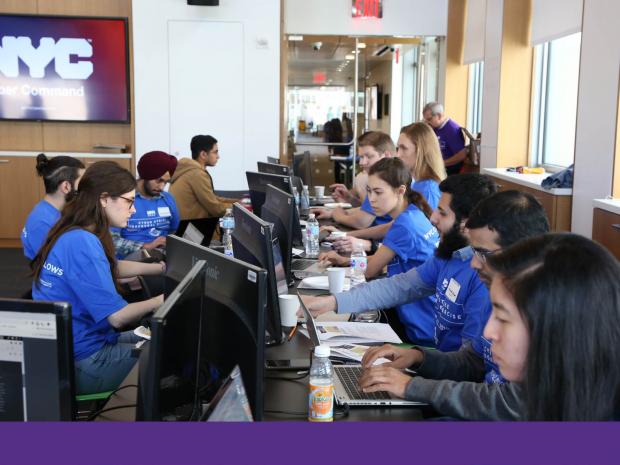Engineering Opportunity
We rethink online education to expand access to advanced engineering degrees

Online education creates pathways to opportunity
“What’s measured gets managed” is a well-known phrase that’s exceptionally true in academia. And higher education has become very focused on measuring and optimizing for admissions selectivity, viewing it as an indirect measure of student and program excellence.
This makes sense when demand is increasing and supply is fixed, as with in-person education where you can only fit so many students in a room. But in online education, when the same constraints don’t apply, using selectivity as a proxy for excellence is not only fundamentally flawed — it’s deeply problematic. And it creates unnecessary and artificial barriers to the education at scale that society needs.
Multiple studies have shown that our current workforce is underemployed. This is especially true for millennials, who are carrying massive college debt, often can’t afford a traditional graduate program, and have increasingly turned to online education. And higher unemployment amid the COVID-19 pandemic is driving more people (and notably women) to reconsider career paths and look online to make that happen.
At the same time, we have skill gaps in critical areas that require advanced degrees. The demand for qualified graduates in STEM fields, in particular, is immense and still growing. In cybersecurity alone, Cybersecurity Ventures projects 3.5 million unfilled jobs globally this year.
Online education offers more people a portal to valuable new skills, and employers therefore have a greater pool of highly skilled applicants. It provides the scale to offer a more flexible and affordable master’s degree without compromising quality. And at a time when there’s a nationwide awakening to systemic inequality that has seen increased commitment to eliminating potentially unfair barriers to entry, it also offers an accessible pathway for people who may not have otherwise considered graduate degrees.
If multiple people share a similar background and equally impressive qualifications for an online program, universities should, in theory, be admitting all of them. If everyone is equally qualified, and course design, community-building, and technology platforms are optimized for large attendance numbers, the number of students has a negligible impact on program quality. But as long as selectivity is a factor in rankings, administrators worried about institutional reputation are incentivized to make subjective decisions to reject some people for the sake of keeping admission rates low.
This unnecessary zero-sum game between quality and reach — and the high reputational cost of admitting more qualified students to at-scale programs — could explain, in part, why for-profit and public universities have made great strides in offering affordable online degrees, but many private institutions have not.
Programs and initiatives at Tandon
Vice Dean for Academic and Student Affairs and Professor of Computer Science and Engineering Nasir Memon, who heads Digital Learning, explains that a multi-pronged approach is vital. To that end, Memon is building a variety of programs and initiatives at NYU Tandon aimed at opening the STEM fields to a wider pool of students at all stages, including:
- The NYU Tandon Bridge program that levels the playing field by offering students with a non-technical background an affordable, flexible way to develop the skills necessary for a STEM master’s degree at Tandon or a partner institution
- The Cyber Fellows initiative, a cutting-edge online cybersecurity master’s degree offered for a fraction of the cost of similar credentials to qualified applicants, that also offers select in-person skill-building experiences like the Cyber STRIKE simulated training exercises
- Innovative partnerships with public and private sector organizations, like TIAA, the NYC Cyber Command, and Zscaler to create co-curricular activities that provide up-to-the-minute, real-world training and tools; give students a chance to earn badges in field-critical technologies; and even offer tuition discounts for qualified candidates
- “MicroMaster’s” and other certificate programs with practical relevance and utility to employers
Many of these initiatives, like the NYU Tandon Bridge program, have expanded their reach as a result of Memon’s perspective on viewing fellow higher ed institutions as valuable collaborators, not competitors. For example, Memon has formed a growing roster of partnerships in Cybersecurity, Data Science / AI / Robotics with other institutions that will accept the Bridge certificate on applications for their own master’s programs. NYU Tandon also just launched a dual-degree program in Cybersecurity with Drew University. And both the NYU Tandon Bridge and Cyber Fellows programs are seeing expansion in reach, including 2020 annual enrollment growth of more than 60% and 250% respectively over the prior academic year.
Memon points out that it’s now imperative to rethink selectivity and devise more modern and meaningful admissions and evaluation benchmarks that take into account other factors, like the diversity of the student body, measurable improvement in relevant skill sets, and the economic contribution of alumni post-graduation. Some institutions have started to tackle this issue, including the University of Colorado, Boulder, which has begun exploring performance-based admissions for their scaled degrees, and Boston University, which is looking at effective ways to measure increases in graduates’ specific skills and competencies. But there’s much more to be done, a larger conversation that must happen around the value that at scale programs provide, and how we can collectively incentivize the right decisions.

